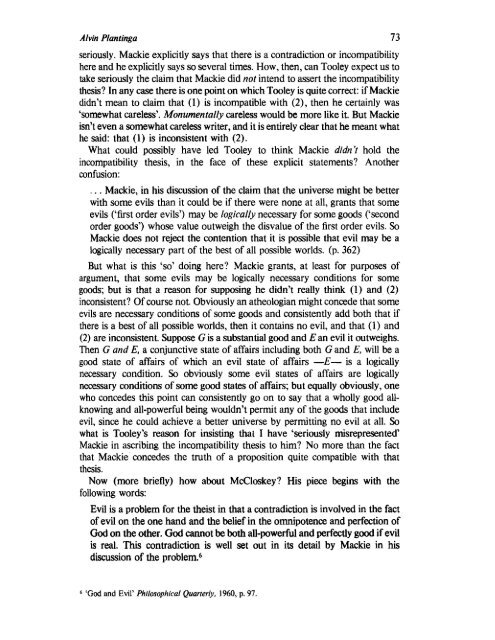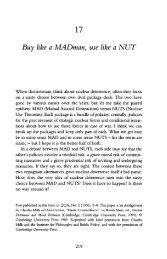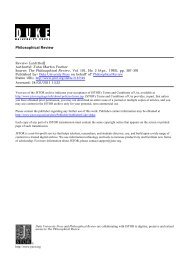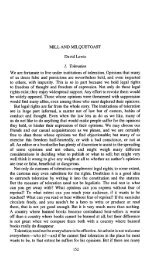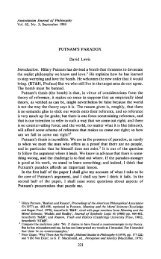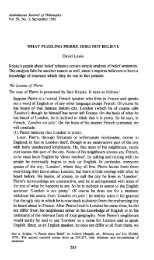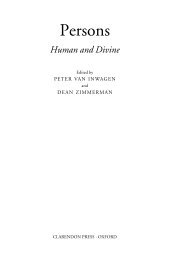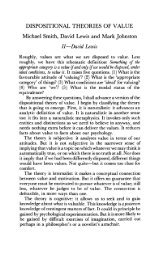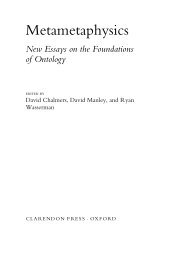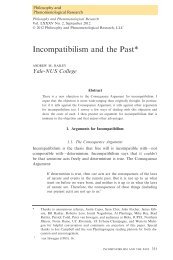Tooley and Evil - Andrew M. Bailey
Tooley and Evil - Andrew M. Bailey
Tooley and Evil - Andrew M. Bailey
- No tags were found...
Create successful ePaper yourself
Turn your PDF publications into a flip-book with our unique Google optimized e-Paper software.
Downloaded by [University of Notre Dame] at 11:51 14 April 2012Alvin Plantinga 73seriously• Mackie explicitly says that there is a contradiction or incompatibilityhere <strong>and</strong> he explicitly says so several times. How, then, can <strong>Tooley</strong> expect us totake seriously the claim that Mackie did not intend to assert the incompatibilitythesis? In any case there is one point on which <strong>Tooley</strong> is quite correct: if Mackiedidn't mean to claim that (1) is incompatible with (2), then he certainly was'somewhat careless'. Monumentally careless would be more like it. But Mackieisn't even a somewhat careless writer, <strong>and</strong> it is entirely clear that he meant whathe said: that (1) is inconsistent with (2).What could possibly have led <strong>Tooley</strong> to think Mackie didn't hold theincompatibility thesis, in the face of these explicit statements? Anotherconfusion:• . . Mackie, in his discussion of the claim that the universe might be betterwith some evils than it could be if there were none at all, grants that someevils ('first order evils') may be logically necessary for some goods ('secondorder goods') whose value outweigh the disvalue of the first order evils. SoMackie does not reject the contention that it is possible that evil may be alogically necessary part of the best of all possible worlds. (p. 362)But what is this 'so' doing here? Mackie grants, at least for purposes ofargument, that some evils may be logically necessary conditions for somegoods; but is that a reason for supposing he didn't really think (1) <strong>and</strong> (2)inconsistent? Of course not. Obviously an atheologian might concede that someevils are necessary conditions of some goods <strong>and</strong> consistently add both that ifthere is a best of all possible worlds, then it contains no evil, <strong>and</strong> that (1) <strong>and</strong>(2) are inconsistent. Suppose G is a substantial good <strong>and</strong> E an evil it outweighs.Then G <strong>and</strong> E, a conjunctive state of affairs including both G <strong>and</strong> E, will be agood state of affairs of which an evil state of affairs --E-- is a logicallynecessary condition. So obviously some evil states of affairs are logicallynecessary conditions of some good states of affairs; but equally obviously, onewho concedes this point can consistently go on to say that a wholly good allknowing<strong>and</strong> all-powerful being wouldn't permit any of the goods that includeevil, since he could achieve a better universe by permitting no evil at all. Sowhat is <strong>Tooley</strong>'s reason for insisting thal I have 'seriously misrepresented'Mackie in ascribing the incompatibility thesis to him? No more than the factthat Mackie concedes the truth of a proposition quite compatible with thatthesis.Now (more briefly) how about McCIoskey? His piece begins with thefollowing words:<strong>Evil</strong> is a problem for the theist in that a contradiction is involved in the factof evil on the one h<strong>and</strong> <strong>and</strong> the belief in the omnipotence <strong>and</strong> perfection ofGod on the other. God cannot be both all-powerful <strong>and</strong> perfectly good if evilis real. This contradiction is well set out in its detail by Mackie in hisdiscussion of the problem. 66 'God .<strong>and</strong> <strong>Evil</strong>' Philosophical Quarterly, 1960, p. 97.


